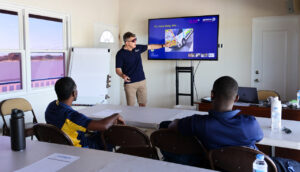![]()
Skilled professionals at the island’s sole sugar factory, Portvale, on Wednesday, sounded the alarm over what they describe as a crisis, citing mismanagement, low worker morale, and ongoing operational failures. Their allegations come amid conflicting statements from government officials and industry leaders over the mill’s management and future.
But Minister of Agriculture Indar Weir has pushed back against these claims, acknowledging some hiccups at the Blowers, St James factory but insisting that allegations of a crisis are exaggerated and only serve to undermine the industry.
Lieutenant Colonel Trevor Browne, the head of the Barbados Sustainable Energy Co-operative Society Limited (Co-op Energy), declared that he could not account for the current state of affairs at Portvale, as the government has yet to complete the transfer of ownership to the cooperative.
“Government has not yet handed over this operation to us, so they are still running it,” he said.
Speaking on condition of anonymity for a group of frustrated workers, an industry expert, with decades of experience at the factory, told Barbados TODAY that concerns are mounting over deteriorating factory equipment, unresolved labour disputes, and a lack of clarity regarding worker ownership shares in the sugar industry.
A major point of contention is the apparent absence of leadership from the newly established Barbados Energy and Sugar Company (BESCO) Ltd.
“This is supposed to be a new company, but we’re not seeing any representation. The same old management team from BAMC (Barbados Agricultural Management Company) is still in place,” the source said. “Workers feel abandoned. There’s no one to address our concerns or provide any sense of direction.”
The transition from the state-owned BAMC to BESCO has also been marred by contractual confusion. Initially, workers were presented with agreements almost identical to their previous BAMC contracts, only to receive a second version later, causing uncertainty.
“Many workers didn’t sign because the union advised us to hold off until negotiations could take place,” the source explained. “The new contract reduced working hours from 56 to 40 per week, with overtime beyond that, but these changes were never properly communicated.”
The expert criticised the handling of labour relations, pointing to ineffective union representation and ongoing disputes over pay, working conditions, and contract terms.
“The union met with management, but nothing meaningful came from those discussions. Workers are in limbo, and resentment is growing,” the source said. “People are being promoted based on connections rather than skill or experience. The integrity of factory equipment is also in question, raising serious health and safety concerns.
“Many people are frustrated and leaving. Morale is at an all-time low. We don’t even know who we’re working for because there’s no visible presence from the new company. We also have a severe shortage of skilled personnel like engineers, mechanics, and electricians.”
Co-op Energy was set to take control of the sugar industry in January 2024 following BAMC’s divestment. Two new firms under Co-op Energy were established—BESCO to manage the factory and Agricultural Business Company (ABC) Ltd to oversee 4 500 acres of farmland. In a landmark move, workers were promised a 20 per cent stake in ownership.
Adding to workers’ frustrations is the lack of transparency regarding their ownership shares in the company.
“No one has explained how the worker-ownership model will function. We haven’t had a single meeting to discuss this,” the source said.
Retrenched workers also told Barbados TODAY that they have received no information on their shares, their value, or the status of pension plans held with BAMC.
![]()
Minister of Agriculture Indar Weir.
The controversy surrounding Portvale comes as Co-op Energy and the government disagree over ownership. On Tuesday, both Weir and Browne gave conflicting statements about who is managing the industry.
Co-op Energy insists the government remains in control, while the government maintains that Co-op Energy is responsible—despite the cooperative’s failure to meet its financial commitment of at least $4 million as part of a $16 million investment agreement.
On Wednesday, Weir acknowledged the workers’ concerns, but said that he had not been made aware of any labour issues.
He said: “Those HR issues have not been brought to my attention. From what I know, all those matters were settled before. Of course, in any organisation, there will be people who want to make it seem as though all is not well because they are dissatisfied with something. But that doesn’t mean it’s the general case.”
As the harvest season progresses, operational problems at Portvale persist, Barbados TODAY was told.
A worker said: “We have serious boiler issues—both are malfunctioning. Steam pressure keeps dropping, making it impossible for the machinery to function properly. We’re out of fuel, we’ve run out of bagasse, and the remaining materials have deteriorated due to rain damage. The little bagasse we have is wet, making it difficult to burn. The decision was made to use diesel on the materials but that led to thick black smoke covering Holetown and surrounding areas, prompting complaints from residents.”
The workers also allege that the government rushed the start of the crop season despite the factory being unprepared.
“The factory wasn’t ready, but we were forced to start anyway. Now we have thousands of tonnes of cane sitting in the yard, deteriorating and spoiling. This is not how you run a factory. We are paying good money for cane at a loss.”
But Weir rejected claims of a systemic failure.
“These comments are oftentimes erroneous,” he said. “The factory did have problems with material. The bagasse got wet in all the rain we were having. And it doesn’t burn well when it’s wet. So that resulted in some slowdown. But there are no mechanical problems with the factory that have been reported to me.”
sheriabrathwaite@barbadostoday.bb
The post Portvale workers seek answers appeared first on Barbados Today.
























